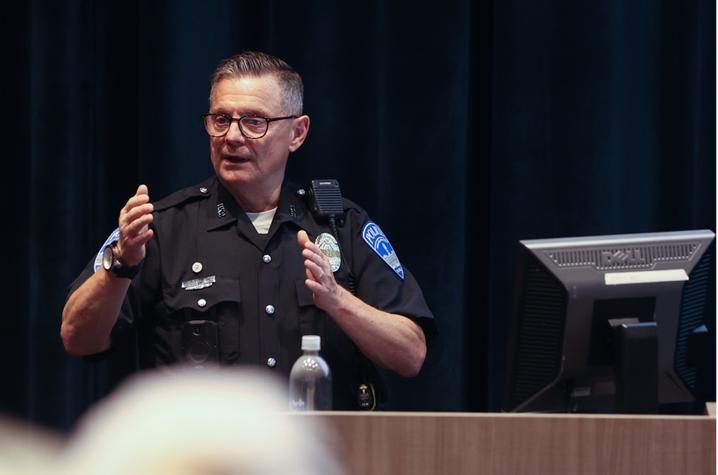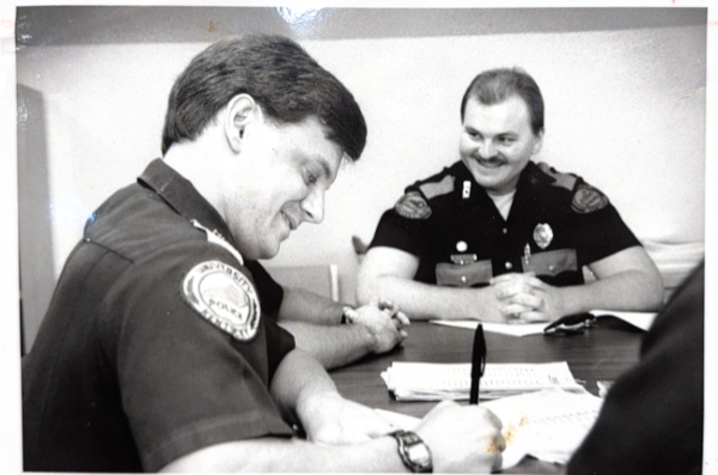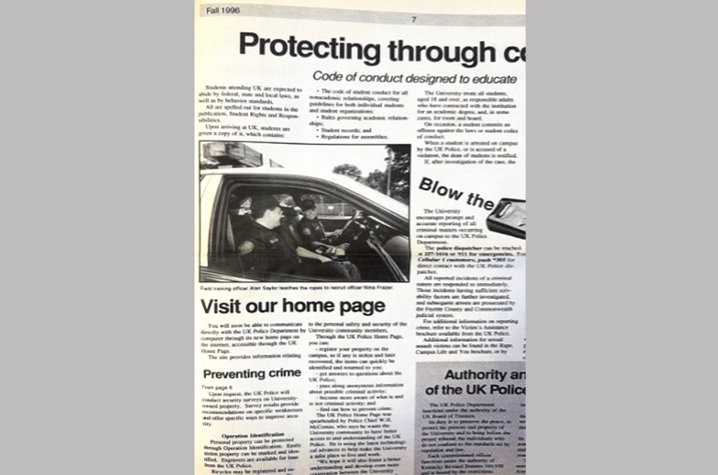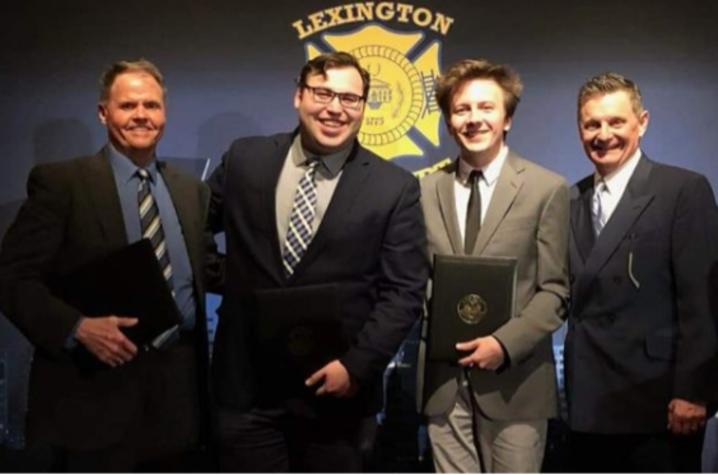A legacy built on safety: One officer’s 40-year commitment to protect UK
LEXINGTON, Ky. (June 6, 2025) — Alan Saylor was born an only child in Cincinnati, but he has called Lexington home since he was 8 years old. He said he has always felt the need to be a fighter, no matter how deep the wounds would be.
And for more than 40 years, he fought for the safety of students, faculty and staff at the University of Kentucky Police Department (UKPD) while watching the department grow into the robust campus safety unit it is today.
From the ground up
In 1972, the Kentucky legislature made history — KRS 164.950 was enacted, allowing all state public universities to create police agencies, marking the official start of UKPD’s legacy and UK’s Public Safety Division.
Since being accredited by the Kentucky Association of Chiefs of Police in 1996, UKPD has grown expansively, from 34 to almost 90 sworn officers and nearly 100 security professionals.
Saylor said what once began as an “underfunded” unit is now setting the standard for university police throughout the United States. Over the past decade alone, the university has invested more than $20 million in campus safety initiatives.
Today, UKPD is made up of units like Crisis Management and Preparedness, Community Services and even a Special Victims Unit — all supporting its mission to protect and serve the campus community with the utmost integrity and professionalism.
And behind that mission are some of the most dedicated police officers in the country —those like Alan Saylor.
Born to fight
Exceeding expectations runs in his blood as the child of a NASA aerospace engineer.
Since he was 16 years old, Saylor always had jobs and responsibilities as part of his daily life. To stop was never an option.
However, even as a 20-year-old business major in college, Saylor knew he did not want to spend the rest of his life behind a desk — he wanted to be challenged and serve others.
Training for local police agencies became his new direction, where he could see himself making a tangible impact in the community.
“I felt like that every day, it’s going to be a mixed bag of things that’s going to happen — I knew it was going to challenge me physically, mentally and intellectually,” Saylor said.
He started his career at the Department of Public Safety at Transylvania University, where he was eventually sent to the police academy. And that opened his eyes to what he truly wanted to pursue — law enforcement.
That was when UKPD came into Saylor's trajectory — on Oct. 10, 1983 — and never left.
Following the example of a father for whom the sky was the limit, Saylor said when he came to UKPD, he already had some plans in mind. One of them was to become a field training officer.
“I can tell you that it’s probably one of the most fun times I’ve had was training new officers and trying to mentor them, although I was still young,” Saylor said.
He is one of the few officers to have seen, firsthand, administrative changes and the different generations that make up UK’s student body — bearing witness to history in the making.
Since the late ’90s, Saylor said he sees a brand-new voice and relevance within UKPD, promoting a variety of community-focused services.
“UKPD is the cutting edge for other agencies,” Saylor said. “We’ve come a long way.”
During his time in service, his leadership of national programs such as the Citizens Police Academy and Self Defense Tactics and Risk Reduction (STARR) created an unexpected legacy among UK students.
The initial intention, which has lasted for generations, was to provide special self-defense training to equip women with defense skills for their physical safety.
After three years of developing STARR, Saylor and five of his colleagues started the program on UK’s campus, which soon became very popular.
“At the time, we had to tell the administration we can’t do another class because we were too beat up,” Saylor said. “We would actually have a scenario attack night, and I estimated one evening teaching a class that I probably received 600 punches and kicks.”
From a self-defense class to an everlasting impact
Saylor recalls in one of his classes that he met a student who had been victimized throughout most of her life, first being abused by her father and then by her husband, in addition to the trauma of being robbed.
“You’re talking about a lady who, when it got dark, she would not go outside the house unless she was with somebody,” Saylor said.
After attending Saylor’s self-defense class three times, she left a gift.
“She sent a tape recording to us,” Saylor said. “It said, ‘I’m sitting in the middle of Shillito Park and it’s dusk and I just wanted you to know I’m not afraid.’”
Saylor said his biggest reward throughout all those years was to see that officers like him make a difference in someone else’s life.
“We go to a call, we handle the call, we settle whatever the issue is, and we move on,” Saylor said. “But in that particular case, we got to see the difference.”
A life that matters
That gift of giving back to the community was repaid in 2019 when UK Gatton Student Center employees saved Saylor’s life.
On Jan. 10, 2019, while on duty, Saylor suffered a heart attack in the Gatton Student Center. Employees Chip Carter, Walter Robinson and Matt Burns, along with nursing student Brandon King, saw Saylor and immediately performed CPR.
Another student, Alex Rosenzweig, called 911.
For Saylor, on that day, the stars aligned, and a “miracle” happened.
It begins with the fact that King, in his last semester of nursing, was not supposed to be on shift that day. But there he was, unexpectedly ready to be part of a mission that is still recalled with care and gratitude to this day.
“He (King), without question, without hesitation, got down and began breathing on me and started CPR on me,” Saylor said.
When the students called 911, Saylor said the ambulance was already on Limestone and Euclid.
“Within 40 minutes, I had two of the largest stents that they make put in my heart,” Saylor said. “Next thing I know, I wake up in my room in intensive care, and my daughter is there, and she’s a nurse.”
While holding his hand, Saylor’s daughter said what has been remembered as another sign that Saylor’s life was a treasure for everyone, in heaven and on earth.
“She says, ‘Daddy, thank God you’re alive,’” Saylor said. “’You have survived a heart attack that only 8% of the population survives.’”
Saylor’s cardiologist, in his 35 years in the field, also told him he has never seen anybody survive that type of heart attack.
What first started as a nearly fatal event brought a community together.
Saylor had friends from his old neighborhood that he grew up with whom he hadn’t talked to for years calling him.
“If anything, what I walked away with is that God has an opportunity to tell me he loved me to a lot of people,” Saylor said.
They all ended up saving a life that is now full of new excitement and routines.
Enjoying the power of silence and stillness never seemed to be on his hectic to-do list during his more than four decades as an officer at UKPD, but now, it is his to keep.
“When you wake up for 42 years and do what you’ve done every day…it’s who I am, it does become who I am,” Saylor said. “I’ve been doing things that I want to do, or I haven’t been able to do.”
Saylor recently celebrated his retirement on May 1, but he said the University of Kentucky will always be a part of him.
“I’ve never been treated any better. I can’t put it into words, and if I did, I feel like I would devalue it in some way,” Saylor said.
Saylor said he may now spend time fixing his dad’s Class A motorhome or riding his motorcycle in town, but the fighter inside of him remains.
“I did what needed to be done and tried to be honorable,” Saylor said. “And as a result, I think it paid off.”
As the state’s flagship, land-grant institution, the University of Kentucky exists to advance the Commonwealth. We do that by preparing the next generation of leaders — placing students at the heart of everything we do — and transforming the lives of Kentuckians through education, research and creative work, service and health care. We pride ourselves on being a catalyst for breakthroughs and a force for healing, a place where ingenuity unfolds. It's all made possible by our people — visionaries, disruptors and pioneers — who make up 200 academic programs, a $476.5 million research and development enterprise and a world-class medical center, all on one campus.








